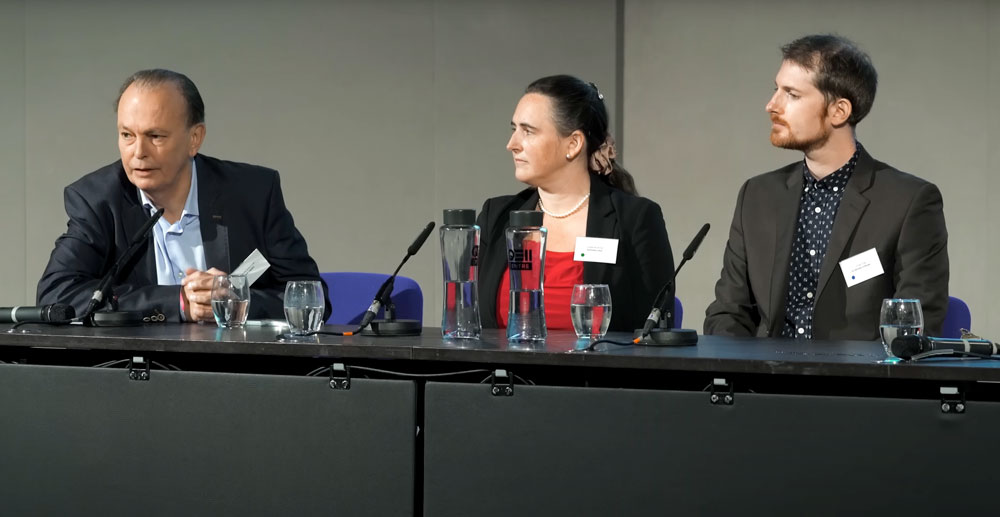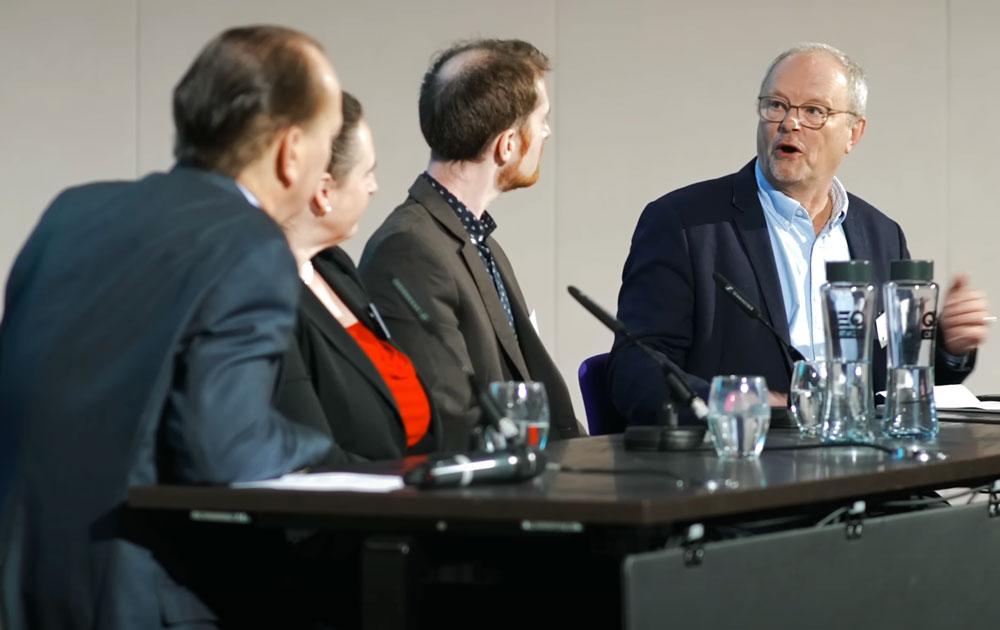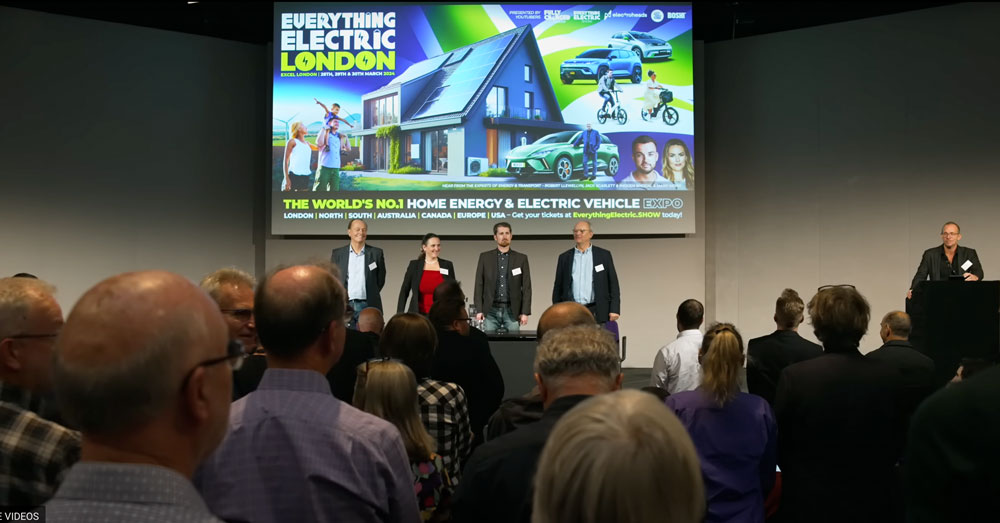Debunking Electric Vehicle Myths with Red Dwarf & Ex-Top Gear Stars
The Shocking Truth About EVs
In a recent episode of the Fully Charged Show, ex-Top Gear presenters joined forces to address and dismantle common misconceptions surrounding electric vehicles (EVs). The episode, titled "Ex-Top Gear Star Sets Electric Car 'Experts' Straight. Shocking Truth About EVs!" was filmed in Westminster before a live audience, comprising politicians, press, and motorists. Northants Carbon Literacy attended the event and here's our takeaways from the day.
 The Misinformation Ramp-Up
The Misinformation Ramp-Up
The presenters were:
- Robert Llewellyn, Founder of Stop Burning Stuff and of TV's Red Dwarf and Scrapheap Challenge.
- Quentin Wilson, Founder of Fair Charge, from TV's Top Gear and a motoring journalist.
- Lorna McAtear, National Grid Fleet.
- Dr. Euan McTurk, Electrochemist, Plug Life Consulting.
- Dan Caesar, CEO Fully Charged Show.
The event highlighted the increasing spread of misinformation about EVs. This misinformation includes exaggerated stories about car park fires, bridge collapses, and battery explosions. Such narratives have been destabilising the transition to electric vehicles, creating unnecessary fear and confusion among potential EV buyers.
Independent Campaign: #StopBS
The show launched the #StopBS (Stop Burning Stuff) campaign, an independent initiative funded by individuals, not corporations. This campaign aims to counteract the misinformation by providing accurate, real-world experiences of EV users. The presenters emphasised the importance of separating truth from fiction in the current climate of misinformation.
Debunking Myths
The panel tackled several myths head-on:
1. EVs and the Environment
- Reduced Emissions: Electric vehicles (EVs) significantly reduce greenhouse gas emissions compared to traditional petrol or diesel cars. Studies, such as those by Hannah Ritchie from Our World in Data, support this, showing that EVs are indeed more environmentally friendly over their lifecycle.
- Energy Efficiency: EVs convert a higher percentage of electrical energy from the grid to power at the wheels, making them more efficient in terms of energy use.
2. Battery Concerns
- Advancements in Technology: Modern EV batteries are more efficient, long-lasting, and environmentally friendly. The discussion highlighted the reduction in cobalt intensity, a critical factor given the ethical and environmental concerns associated with cobalt mining.
- Cobalt-Free Batteries: The move towards cobalt-free batteries, like those used by Tesla, represents a significant step in making EVs more sustainable and less dependent on problematic materials.
3. Fire Risks
- Lower Incidence of Fires: Contrary to the common myth, EVs are less likely to catch fire than their fossil fuel counterparts. The Swedish Civil Contingencies Agency's data indicates that electric cars catch fire less often than fossil fuel cars.
- Safety in Design: EVs undergo rigorous safety testing, and their design often includes advanced safety features to prevent and contain fires should they occur.
4. Infrastructure and Grid Capacity
- Grid Readiness: Concerns about the electricity grid's inability to support the growing number of EVs are often overstated. National Grid reports have shown that with proper management and investment, grids can easily handle the increased demand.
- Smart Charging: The development of smart charging solutions, which optimise charging times and power usage, further alleviates pressure on the grid.
5. Cost and Accessibility
- Decreasing Costs: The initial cost of EVs is becoming more competitive with traditional vehicles. This change is driven by the decreasing cost of batteries and increased production scale.
- Total Cost of Ownership: When considering the total cost of ownership, including fuel and maintenance, EVs can be more economical in the long run. Studies, such as those referenced by the World Economic Forum, support this, showing that owning an EV in Europe can be cheaper than many anticipate.
Audience Feedback
 Audience participation played a significant role in highlighting the real-world experiences and perceptions of EV users. Here are some key moments from the event:
Audience participation played a significant role in highlighting the real-world experiences and perceptions of EV users. Here are some key moments from the event:
-
EV Ownership Experience:
- When asked to stand up if they drive a battery electric vehicle, a significant number of audience members stood up, showcasing the growing adoption of EVs among the public.
- Further, when asked to stand up if they drive a battery electric vehicle and have no intention of going back to a combustion engine vehicle, again, a large majority of the audience stood up. This response indicates a high level of satisfaction and commitment to EVs among current users.
-
Media Representation vs. Lived Experience:
- The audience was asked to stand up if they believe that the mass media representation of battery electric vehicles bears little resemblance to their lived experience of them. Almost everyone stood up, suggesting a disconnect between media narratives and the actual experiences of EV drivers.
-
Impact on UK's Economic Prospects:
- Lastly, when asked to stand up if they believe that the mass media representation of battery electric vehicles only harms the UK's economic prospects, once again almost all audience members stood up. This indicates a concern among EV users and enthusiasts that misinformation in the media could negatively impact the country's progress in adopting cleaner, more sustainable transportation technologies.
These responses from the audience members at the event underscore the huge gap between public perception and media portrayal of EVs, as well as the enthusiastic support for electric vehicles among those who have adopted them.
Conclusion
The Stop Burning Stuff (#STOPBS) event serves as a crucial platform for clarifying misconceptions about electric vehicles. By bringing together experienced voices in the automotive industry, the show aims to educate and inform the public, paving the way for a more informed and rational discourse about the future of transportation.
Electoral Commission Imprint: Promoted by D.Dell on behalf of Northamptonshire Green Party c/o 38 Waverley Rd, Kettering, NN15 6NT

